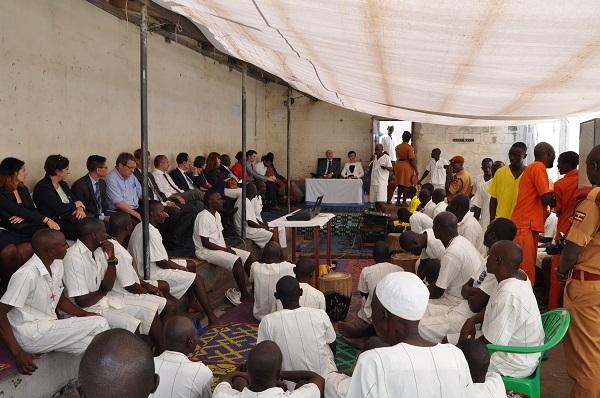EU Ambassadors visit Luzira deathrow inmates

The visit was organised in partnership with the Foundation for Human Rights Initiative as part of a range of events to mark the 15th World Day Against the Death Penalty, under the theme “Poverty and Justice: A deadly mix".
The delegation was led by the European Union Ambassador designate, H.E Attilio PACIFICI, and included Ambassadors and representatives from Austria, Belgium, Denmark, France, Germany, Ireland, Italy, Netherlands and the United Kingdom.
The delegation listened to the plight of death row inmates, both at the women's and men's wing of the prison. The inmates sang symbolic songs expressing calls for redemption, mercy and a second chance in life, urging Ugandan authorities to abolish the death penalty.
"What we have seen here today has really touched us and we will not forget. We will do whatever we can do to support you," said Ambassador designate Pacifici.
"You are all human beings," said the Ambassador of France to Uganda, H.E Stephanie RIVOAL, in a message to the female death row inmates. "We do not believe in execution, we believe in redemption. Society can rise above this because at the end of the day, the death penalty does not prevent crime."
The main objective of the 2017 World Day Against the Death Penalty is to raise public awareness about the link between poverty and death penalty.
The EU Delegation to Uganda, and the French Embassy, working in close collaboration with FHRI, organized a series of events to mark the Death Penalty Day. On Tuesday 10th October, FHRI Executive Director, Mr Livingstone Sewanyana and H.E. the French Ambassador, Ms Stephanie Rivoal, spoke during the 'Morning Breeze' on NBS TV. That afternoon, FHRI hosted a half-day commemoration event at the Human Rights House, Nsambya.
The EU Ambassador designate and the French Ambassador spoke at the ceremony reiterating EU committment to support death penalty abolition in Uganda. At the event, the findings of a survey report on socio-economic conditions of people sentenced to death in Uganda was released showing that individuals with low income, limited English proficiency (being the language used in legal procedures and court) and lack of education are more likely to receive the death penalty upon conviction due to lack of access to credible defence.
